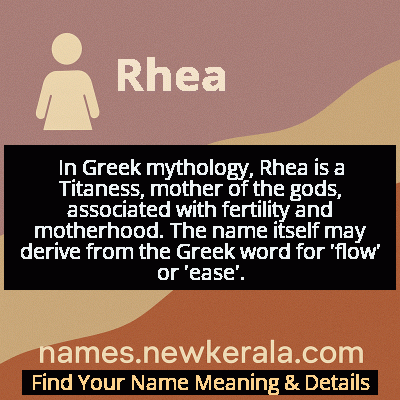Rhea Name Meaning & Details
Origin, Popularity, Numerology Analysis & Name Meaning of Rhea
Discover the origin, meaning, and cultural significance of the name RHEA. Delve into its historical roots and explore the lasting impact it has had on communities and traditions.
Name
Rhea
Gender
Female
Origin
Greek
Lucky Number
5
Meaning of the Name - Rhea
In Greek mythology, Rhea is a Titaness, mother of the gods, associated with fertility and motherhood. The name itself may derive from the Greek word for 'flow' or 'ease'.
Rhea - Complete Numerology Analysis
Your Numerology Number
Based on Pythagorean Numerology System
Ruling Planet
Mercury
Positive Nature
Adventurous, dynamic, curious, and social.
Negative Traits
Restless, impatient, inconsistent, prone to indulgence.
Lucky Colours
Green, white.
Lucky Days
Wednesday.
Lucky Stones
Emerald.
Harmony Numbers
1, 3, 9.
Best Suited Professions
Sales, marketing, travel, entertainment.
What People Like About You
Versatility, charisma, adventurous spirit.
Famous People Named Rhea
Rhea Perlman
Actress
Four-time Emmy Award winner for Cheers
Rhea Seehorn
Actress
Critically acclaimed role in Better Call Saul
Rhea Chakraborty
Actress and TV host
Bollywood actress and television personality
Rhea Ripley
Professional Wrestler
WWE Women's World Champion
Name Variations & International Equivalents
Click on blue names to explore their detailed meanings. Gray names with will be available soon.
Cultural & Historical Significance
Her worship was particularly prominent in Crete, where she was associated with the mountain goddess Cybele in later periods. The mythological narrative of Rhea saving Zeus by substituting a stone wrapped in swaddling clothes demonstrates her intelligence and resourcefulness, qualities that made her a respected and powerful figure in the ancient Greek religious landscape. The name's etymology possibly derives from 'rheo' meaning 'to flow,' connecting her to the flow of generations and the natural cycles of life, making her a symbol of continuity and the enduring power of maternal love in the face of tyranny.
Extended Personality Analysis
Individuals named Rhea are often perceived as nurturing, strong-willed, and protective, reflecting the mythological attributes of their namesake. They typically exhibit maternal instincts regardless of gender, showing deep care for family and loved ones. Rheas are known for their resilience and ability to navigate challenging situations with grace and intelligence, much like the Titaness who outsmarted Cronus to save her children. Their personality often combines traditional warmth with modern independence, creating a balanced character that values both emotional connections and personal autonomy.
Many Rheas demonstrate natural leadership qualities and a protective nature toward those they care about, often taking on the role of peacemaker or protector in social and family dynamics. They tend to be resourceful problem-solvers who approach difficulties with creative solutions rather than brute force. The name carries an energy of quiet strength and determination, with many Rheas showing particular aptitude for careers involving caregiving, education, or creative fields where their nurturing nature and strategic thinking can shine. Their combination of emotional intelligence and practical wisdom often makes them trusted advisors and reliable friends.
Modern Usage & Popularity
Rhea has experienced a significant resurgence in popularity in the 21st century, particularly in English-speaking countries. According to Social Security Administration data, the name ranked #572 in the United States in 2022, showing steady growth from being outside the top 1000 in the early 2000s. This revival aligns with broader trends favoring mythological and classical names that have strong female associations. The name's appeal lies in its perfect balance of mythological gravitas and contemporary accessibility - it's recognizable but not overly common, classical but not antiquated. In the UK, Rhea has maintained consistent moderate popularity, while in Australia it's seen as a fashionable choice that bridges traditional and modern sensibilities. The name works well across diverse cultural contexts due to its simple pronunciation and elegant spelling, making it a global favorite among parents seeking names with depth and character that won't be mispronounced or feel dated.
Symbolic & Spiritual Meanings
Symbolically, Rhea represents maternal protection, fertility, and the enduring strength of nature in its most nurturing form. As the mother who saved the future king of gods from destruction, she embodies the ultimate protective instinct and strategic intelligence of motherhood. The flowing stream meaning of her name connects her to the life-giving properties of water and the continuous flow of generations through time. In psychological terms, Rhea symbolizes the archetype of the Great Mother - nurturing yet powerful, gentle yet unyielding in protection of her young. Her mythological role in the transition from Titan to Olympian rule makes her a symbol of necessary change and the wisdom required to navigate profound transitions successfully. The stone she substituted for baby Zeus represents the ability to use clever deception for protective purposes, making her a symbol of strategic thinking in service of higher values and the preservation of future potential against immediate threats.

